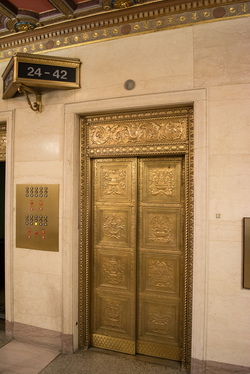|
Most likely, you've heard about an elevator pitch, but have you ever applied this topic to a job promotion or a professional interview?
If you are not familiar with the concept, an elevator pitch is a short (3-5 minute) statement that is designed to accomplish a pre-defined goal (e.g. advocate for a promotion or land a job of your dreams). The concept comes from a hypothetical situation that you are sharing an elevator with a decision maker who can promote you, hire you, or let you go, and you want to use the limited time in the elevator to make a strong statement to this person. If your statement is successful, you will either agree to meet later to continue the conversation, or exchange contact information to set up another conversation to discuss the topic further. Both are favorable outcomes. Alternately, if you are not able to present yourself or your point concisely, it could result in a missed opportunity or even worse, in a damaged opinion about you as an employee. This results in two seemingly contradicting rules: 1. Never miss on an elevator pitch opportunity. 2. Don't jump on an elevator pitch opportunity until either you or the recipient are ready. Let's discuss the first statement. An elevator pitch (meaning: dedicated time from your company's executive to hear about your project or idea) does not happen every day. As a result, you may find out from this person's executive assistant when this decision maker is available (goes for lunch to the company cafeteria, walks out of the office to the parking lot. etc.) This does not have to be in the elevator and neither does it have to be specially organized. You wouldn't know to deliver your elevator pitch about your contributions and the fact that you feel you've grown to the next phase in your career if you have not shared it with anyone prior to the engagement. Now the second one. Under no circumstances stalk your recipient. You want to share but you do not want to impose on the recipient. Wait for a question. Make sure your elevator pitch is short. Make pauses as you go through it. Remember: the goal is not to deliver information, the goal is to build a relationship. Practice active listening techniques as you work more on this topic. And now, final advice: at any moment of time, you should know your elevator pitch by preparing a strong statement and learning it by heart. Elevator pitch could be about you (e.g. "Hi, I am WIll Evans, I work for Accounts Receivables. Wanted to share with you that last month, we increased AR collection by 26%. The reason is that I came up with the suggestion to call their partnering executive instead of the payments department and walk them over the new regulation which shows that their payments to us are tax deductible. According to my initial estimates, this saved us over $ 3M." Your elevator pitch can be about yourself, you group, your practices. In each case, please target your story to specific situation (you may want to learn at least a couple, one specific to you as a professional and one about your team and group).
0 Comments
Leave a Reply. |
About the BlogThe difference between our career advice site and many others on this topic comes from the fact that it is not written by a career consultant who has limited experience with achieving career growth in a professional environment. This site comes from an industry expert who achieved career progression step by step and learned the lessons that are now generously shared with you. To see our answers to user-submitted questions:ArchivesCategories |

 RSS Feed
RSS Feed